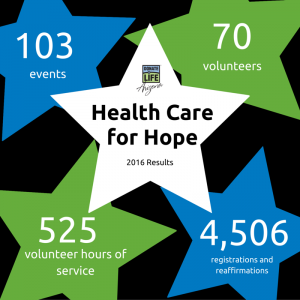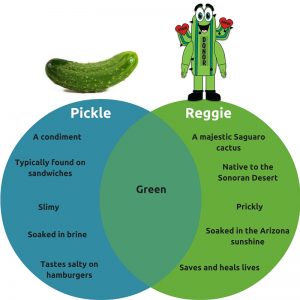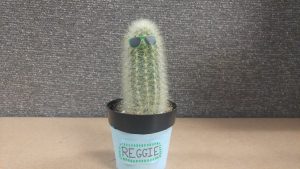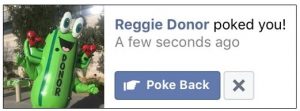Slam Dunk for Donation with Phoenix Mercury
Thanks to the Phoenix Mercury, heart recipient and Donate Life Arizona volunteer Evelyn Strope enjoyed a night of special recognition with the team she loves.
At the age of 14, Strope was diagnosed with ventricular septal defect, a medical condition that creates a hole in the wall of the heart, dividing the left and right ventricles. By the time she was 20, she had undergone two open heart surgeries to try to fix the problem.
It was during her second operation that Strope was diagnosed with congestive heart failure. Her only option to live depended on a lifesaving heart transplant. Due to her worsening condition, Strope, who loved playing basketball and dreamt of joining the WNBA, was not able to play the sport she so deeply loved.
Her health continued to decline, and after spending nearly nine months in the hospital and being on heart medication for 10 years, Strope, now 30, was added to the national transplant waiting list. Nearly two years later, she received the news she had hoped for: a heart was available for her. Since receiving her lifesaving transplant, Strope has been able to go on cruises, visit national parks and play basketball again. Strope has also had the opportunity to meet the family of her donor, a 15-year-old girl named Amber.
“She means the world to me. She gave me a second chance at life that I wouldn’t have had otherwise; she’s given me the opportunity to fulfill my dreams that I wouldn’t have been able to do,” says Strope.
A Game to Remember
On Friday, July 14, the Phoenix Mercury honored Strope and Donate Life Arizona with a night to remember. The hometown female basketball team invited Strope to the court to watch the team warm up for their game against the Minnesota Lynx, one of their fiercest rivals. She was wearing the jersey the Phoenix Mercury made just for her, with number eight representing the number of lives someone can potentially save through organ donation.
While waiting for the game to start, fans watched the Donate Life Arizona message broadcasted on the many screens around the arena, encouraging them to register to give the gift of life.
The excitement culminated for Strope when the Phoenix Mercury presented her with a ball signed by the whole team during half time. Thanks to her lifesaving transplant she can cheer on the Phoenix Mercury and enjoy more time with her loved ones.
Partnership to Save Lives
All season Donate Life Arizona has been scoring slam dunks for donation with the Phoenix Mercury WNBA team! The Phoenix Mercury chose Donate Life Arizona to attend games to educate and register basketball fans as organ and tissue donors this summer. Thanks to the enthusiasm and generosity of X-Factor Mercury fans and game attendees, Donate Life Arizona has received 80 new registrations so far! These new registered donors have the power to save more than 600 lives through organ donation and heal up to 4,000 more through tissue donation.
Attend upcoming games on Aug. 12 and Aug. 24 to register or reaffirm your commitment to donation and get some free Donate Life swag and a chance to win a signed photo of a Mercury team member!

Donate Life ECHO to Save Lives
At just 4 days old, Adrianna Martinez’s doctors confirmed she was born without small intestines, and her only chance for survival was a transplant.
Adrianna’s family waited patiently as their little girl grew big enough for a transplant, and in November 2009, seven days after her first birthday, Adrianna received a liver, pancreas and small intestine transplant.
Currently there are more than 2,300 people in Arizona on the national organ transplant waiting list. Of those waiting in Arizona, more than 59 percent are minorities, a number that is reflected across the board nationally, according to the United Network for Organ Sharing.
From July 9 to July 22, we celebrate the fact that everyone has the opportunity to save lives through organ and tissue donation. The Association for Multicultural Affairs in Transplantation partnered with Donate Life America in 2015 to create Donate Life ECHO, which stands for Every Community Has Opportunity. Donation gives every community the chance to make a difference, and some even watch the gift of life come full circle.
Adrianna is now a healthy 4-year-old, and everyone in Adrianna’s family has since registered as donors.
“Her story has inspired many of our friends and family,” says Tasha Bowman, Adrianna’s mother. “Some were once afraid to donate, and now they support it.”
These two weeks of Donate Life ECHO bring attention to the current health needs of multicultural communities and help encourage registrations and education to end the waiting list.
Join Donate Life Arizona and Arizona Hospital and Healthcare Association on July 18 from 10 to 11 a.m. MST for a Twitter chat about #DonateLifeECHO. Give hope to those who are waiting on the generosity of a stranger by linking your community to the conversation and registering to be an organ and tissue donor.
“Donation gave Adrianna a normal life. We are so grateful to the family who donated their loved one’s organs,” says Tasha.
Words from a Donor Family

Michelle Montijo (r) remembers Celeste Machiche (pictured) with her family. Her sister always loved wearing red Chucks and spreading her happiness freely.
“Celeste believed in the good of people, in generosity, in motivating others and in listening with a gentle and non-judgmental spirit. She freely shared her infectious smile, positive attitude and gave the best of herself always.”
On May 23, 2012, Celeste Machiche sustained a traumatic brain injury. Just four weeks prior, at 20, she had registered as an organ, cornea and tissue donor. After death, she gave a second chance at life to four other people.
It was just 20 years earlier when Machiche’s grandfather received a kidney from a young man who had also passed away in a vehicle crash. Her family believes that Machiche took that act of generosity to heart when she registered as a donor.
Her only sibling, Michelle Montijo, shared the impact her sister created through her generosity with health care professionals on May 19.
“I am proud to say Celeste’s preparation and mature choice has helped in our journey of grief. Celeste’s decision minimized our guilt and fear, and we didn’t have to question if donation was the right choice.
In spite of our indescribable heartache, we were able to grasp onto hope, something we so desperately needed at a time when we felt like all hope was lost. One of the greatest fears of a grieving family is that their loved one will be forgotten, and that their name will no longer be said. In knowing she gave life to others, Celeste’s name and love lives on.
As you return to your workplace may you be reminded that your commitment to donation affects those around you, and every action you and your team take matters. By ensuring donation protocol is followed, that your patients and families are treated with dignity and respect, and ensuring a patient’s authorization to be a donor is communicated to Donor Network of Arizona, you too will give grieving families the gift of peace. Your actions, just like my sister’s, are profoundly important, allowing the opportunity to spread love and generosity through donation. On behalf of myself, my family and our Celeste, we thank you for your dedication to this work. May you be inspired by Celeste and the many other donors to continue to make a difference in people’s lives by your continued support of organ, cornea and tissue donation.”
To register in honor of Celeste, please visit her page on LiveOnAZ.org.
The 30th Anniversary Blue and Green Gala
Donor Network of Arizona (DNA) and its partners gathered to celebrate 30 years of saving and healing lives during the 30th Anniversary Blue and Green Gala on Nov. 11, 2016. The donation process in Arizona is an intricate program that relies on the support of many stakeholders all across the state. None of this work would be possible without the help of many partners – from media partners who bring heartfelt donation stories to their communities to hospital employees who care for their patients and fulfill the last wishes of donors and their families.
These are some examples of the people who save more lives than they know every time they come to work or bring donation into their communities. At the Gala, DNA presented 42 awards to its community, governmental, health care and media partners.
Karla Navarrete, reporter for CBS 5 Arizona and 3TV KTVK, emceed the award ceremony and shared her personal donation story. Because of her father’s heart transplant, Karla had the chance to spend 10 more years with him.
Celebrated on Veteran’s Day, the Gala highlighted Diana Pike’s story of her son Christian who saved five people through organ donation after he was killed in the line of duty. Christian was known for his generosity and giving soul. His “last act of service was being an organ donor,” says Pike.
Veteran and heart recipient Larry Fowler showed just how much his family had been touched by donation. His life and the life of his twin brother depended on the generosity of an organ donor after they both experienced heart failure due to a genetic condition.
Even with DNA’s small beginnings, so many lives have been saved over the past 30 years as the organization has grown. This growth is all thanks to the generosity of donation champions, donors and their families.
Health Care for Hope: 2016 Results
In April, Donor Network of Arizona (DNA) held its annual registry challenge, Health Care for Hope. DNA partnered with hospitals and health care organizations throughout the state to encourage Arizonans to register as organ, eye and tissue donors. The results of this year’s challenge were astounding!
DNA surpassed its goal of 4,000 donor registrations and reaffirmations. In total, 4,506 people registered or reaffirmed their commitment to donation during Health Care for Hope. If one donor can save up to eight lives and improve the lives of more than 50 people, it is difficult to imagine the scope of this generosity. The ripple of hope will touch countless Arizonans for years to come.
On Monday, June 13, DNA recognized its hospital and health care partners at the Health Care for Hope 2016 Awards Breakfast. Among many esteemed award recipients, Banner – University Medical Center Phoenix won the most overall registrations, Walgreens won the most registrations for a health care organization, and Mercy Gilbert Medical Center won the Best Cookie award.
Every participant made an incredible contribution to the challenge. Participants’ efforts give hope to more than 2,300 Arizonans awaiting a lifesaving organ transplant. DNA looks forward to continuing these partnerships in 2017!
Reggie the Donor Cactus is Back in Business
In March, Reggie the Donor Cactus returned to his role as Donate Life Arizona’s mascot after several months on sabbatical. While his co-workers were happy to see him, they noticed a distinct change in his appearance. Most notably, they commented on his size. “He looks like Reggie the Hulk!” exclaimed one volunteer. “I barely recognized him.”
Not all of the rumors were so flattering, however. While some whispered about performance-enhancing drugs, others openly taunted the 10-foot-tall Saguaro. “You look like a pickle!” one heckler shouted. Reggie isn’t fazed by the haters, however. I had the opportunity to sit down with him last week to talk about what inspires him, and get his take on the pickle controversy.
Q: How does it feel to be back in action?
A: It’s great to be back! I enjoyed my time off, but I love what I do. My time away really gave me a fresh perspective. I’m more committed than ever to saving and healing lives through organ, eye and tissue donation.
Q: You were MIA for almost a year. What were you doing?
A: Well, as you can see, I spent a lot of time at the gym. Honestly, I just needed some “me time.” I traveled, soaked up the sun and read some books. I got to spend a few months backpacking through Europe with my mentor, Dr. Prickle E. Pear. It was great to see the world beyond the Sonoran Desert.
Reggie takes Paris.
Q: You’re obviously in great shape. Tell me about your workout routine.
A: A body like this takes time. The advice I would give other cacti is be patient. I mean, it took me almost 75 years to grow my first arm! And squats. I do a lot of squats.
Q: There are a lot of nasty rumors going around. What would you say to people who call you a pickle?
A: Cacti have pretty thick skin, and we’re used to being poked. Some people are just a little prickly. I don’t let it get to me. But knowledge is power! That’s why I created the handy diagram, below.
Reggie is NOT a pickle.
Q: Most cacti are content to spend their entire lives sunbathing. What inspired you to become a mascot?
A: Ever since I was a little sprout, I knew that I was meant for something more. In college, I took a class on organ, eye and tissue donation. Did you know there are more than 2,300 people in Arizona waiting for a lifesaving organ transplant? That’s when I joined the Donate Life Arizona team. As a mascot, I encourage people to register as donors. It feels good to know my work is saving lives!
Reggie was a cute little sprout.
Q: You seem to like your privacy. I haven’t seen you on the cover of People Magazine yet! What advice would you give your fans who want to learn more about you?
A: I’d love to be your friend on Facebook! Add me at https://www.facebook.com/registerwithreggie to get the inside scoop on all things Reggie.
Ouch!
DNA Captures Four Pinnacle Awards
Arizona’s Organ Recovery Organization Captures Four National Awards
Donor Network of Arizona received four Pinnacle Awards from Donate Life America on Oct. 20.
PHOENIX— Donor Network of Arizona (DNA), the state’s federally designated, nonprofit organ recovery organization, earned several distinctions at Donate Life America‘s Annual Meeting on Tuesday, Oct. 20. Donate Life America received more than 50 submissions from 28 organ recovery organizations from across the country and awarded DNA four out of a total of 10 awards.
Swipe to Donate Life, the first-of-its-kind technology for registering people as organ, eye and tissue donors, received the Game Changer Award and was the winner of the Miscellaneous category.
The Swipe technology was developed through a partnership with Countermind, LLC and registers individuals as donors with a swipe or scan of a driver’s license. The swipe or scan populates the preprogrammed fields with the registrant’s information, including name, address and birth date. After the registrant verifies their information and accepts the terms, they are added to the DonateLifeAZ Registry in real-time via a Wi-Fi access point. The technology saved DNA more than 200 hours of data entry in 2014 alone.
Winning Best Remix Award was DNA’s 2014 Campus Challenge, a campaign which registers college students as organ, eye and tissue donors. The highlight of this campaign was DNA’s call to have students “Make YOLO mean more,” in which the popular phrase, “You Only Live Once” transformed to “Your Organs Live On.” The 2014 Campus Challenge registered just under 3,000 Arizona college students as organ, eye and tissue donors.
Finally, DNA’s Health Care for Hope campaign, which involved more than 50 Arizona hospitals and health care organizations in registering their communities as donors, received the Hospital Pinnacle Award. The 2014 Health Care for Hope campaign registered nearly 6,000 Arizonans as donors.
In Arizona, more than 54 percent of the adult population is registered as organ, eye and tissue donors, just above the national average. Last year, Arizonans saved 427 lives, gave sight to more than 1,000 people and healed tens of thousands through their generous gifts of donation.
Arizonans can sign up as registered organ, eye and tissue donors when they apply for or renew their driver’s license or ID at the Motor Vehicle Division (MVD). They can also become donors by signing up online at DonateLifeAZ.org or calling 1-800-94-DONOR.
###
Welcome to the New DNAZ.org!
Welcome to the launch of the new DNAZ.org, the official website for Donor Network of Arizona (DNA), the federally designated, nonprofit organ procurement organization for the state.
On this site you will find information about DNA and organ, eye and tissue donation and transplantation. The site offers resources for health care professionals, donor families, transplant recipients and our many partners throughout the Arizona community.
Here on our DNAZ.org blog, we will update regularly with organizational news and stories of donation and transplantation, as well as Spanish-language posts for Arizona’s Spanish-speaking community.
Thank you for helping DNA make the most of life through the gifts of organ, eye and tissue donation!








